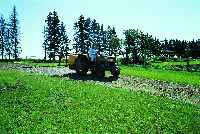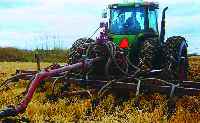| | Noise | Dust | Odour | Traffic volumes
Issues for neighbours of crop operations include environmental concerns (see Section 2.0) and nuisances like noises, dust and odours. Noises, dust and odours can seriously harm the quality of life for neighbours and may have other impacts. Communication with your neighbours, planning of your farm activities to reduce nuisances, and commonsense consideration of others can often reduce or prevent these problems.
Noise
Noise concerns for neighbours often relate to the volume of the sounds and/or the timing. Try to prevent noise problems before they develop. Noise problems left unresolved can cause bad relations between you and your neighbours.
BMPs to prevent or reduce noise problems:
- Keep a noise source and the neighbours an adequate distance apart.
- Properly maintain machinery.
- Restrict noisy activities to regular daytime hours, whenever possible. Confine night-time activity to those areas most remote from neighbours.
- When possible, avoid noisy practices during weekends, especially long weekends.
- Ensure that mufflers are functioning as designed, and avoid leaving equipment idling for prolonged periods near neighbouring homes.
- Where possible, avoid night operation of irrigation pumps located near neighbours.
- If equipment is to be used as a stationary power source, erect a noise barrier.
- The fan/burner unit of a grain dryer can be noisy. Locate fans on the side of the building facing away from neighbours and direct the fan intake axis away from neighbours. Older dryers can be refitted with newer, quieter fans. Use fans with low decibel ratings or fans with adjustable pitch blades that provide some control of noise level.
Dust
Dust concerns from crop operations can arise from blowing soil and from farm-related traffic. Blowing soil can cause respiratory problems with people and animals. Blowing soil may also contain seeds, pollen and plant tissue, as well as agrochemicals, including pesticides. These materials can cause health problems and, in the case of pesticides, contaminate non-target areas. Blowing soil can also reduce visibility on roads and highways and result in serious traffic accidents. As well, clearing roads and ditches of blown soil from dust storms can be expensive for municipalities. Dust from farm traffic can be a concern during peak agricultural activity, such as harvesting or manure hauling.
BMPs to reduce dust problems:
- Use practices to prevent wind erosion such as reducing or eliminating tillage (see Section 3.3).
- When possible, reduce farm-related traffic immediately before and on weekends, especially long weekends.
- Wet down the road in front of neighbours' yards and slow down your travel speed near their yards.
- Drive with your lights on so others can see your vehicle more easily.

During periods of heavy farm-related traffic, wet down dusty roads near neighbouring residences.
Courtesy of ARD
Odour
Frequent strong odours can be very unpleasant for neighbours, disrupting their routines and reducing the pleasure they take from being on their property. The most common odour concerns for neighbours of cropping operations are from manure and silage operations.
BMPs to reduce odour concerns for your neighbours:
- Let neighbours know in advance when manure spreading or other odour-producing activities are planned.
- If neighbours have special events planned, try to work around them.
- When possible, avoid practices that cause odour on or immediately before weekends, especially long weekends.
- Spread manure on cool days with some air movement for better odour dispersion.
- Spread manure when the wind is blowing away from neighbours.
- Incorporate manure within 12 hours, or inject manure.
- Locate silaging facilities downwind from nearby residences.
- Use composted manure in odour-sensitive areas.

Manure injection reduces odours.
Courtesy of Tri-Provincial Initiative
Traffic Volumes
At busy times of year, farm traffic volumes can be high and may be a nuisance for neighbours.
BMPs to prevent or reduce traffic volume concerns:
- Inform neighbours when traffic volumes are going to increase, and let them know how long the heavy traffic is expected to continue.
- Post signs in the area to let drivers know that heavy traffic can be expected.
- As much as possible, avoid heavy traffic late at night and early in the morning.
- Slow down when driving near residences.
- Don't overload trucks. Properly cover the load to reduce the risk of material being spilled or blown off from the load. If a spill occurs, clean it up as soon as possible.
- Adhere to community traffic bylaws. Reduce speed to take road conditions into account. Avoid travelling in very wet conditions.
Back to Chapter 8 - Community Relations |
|